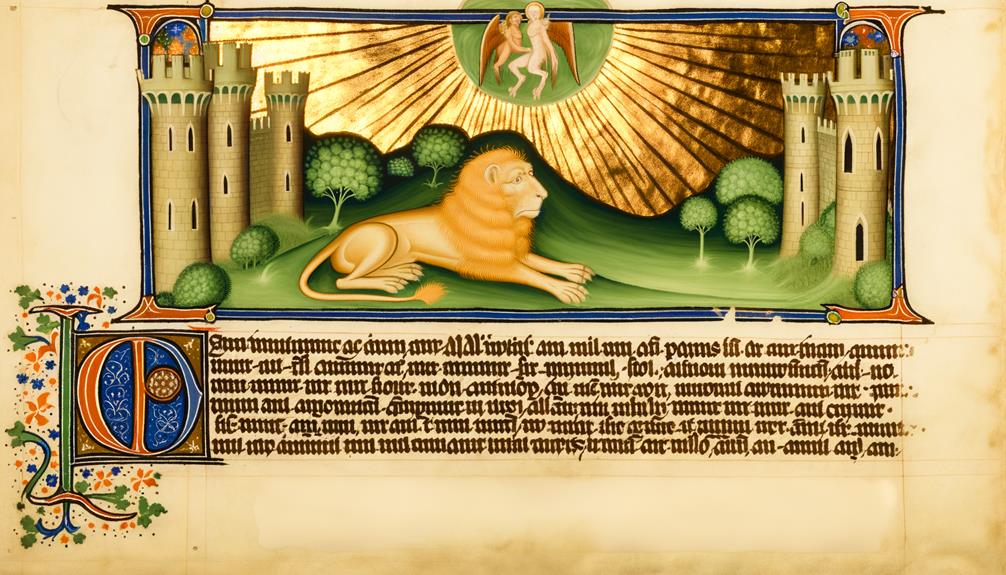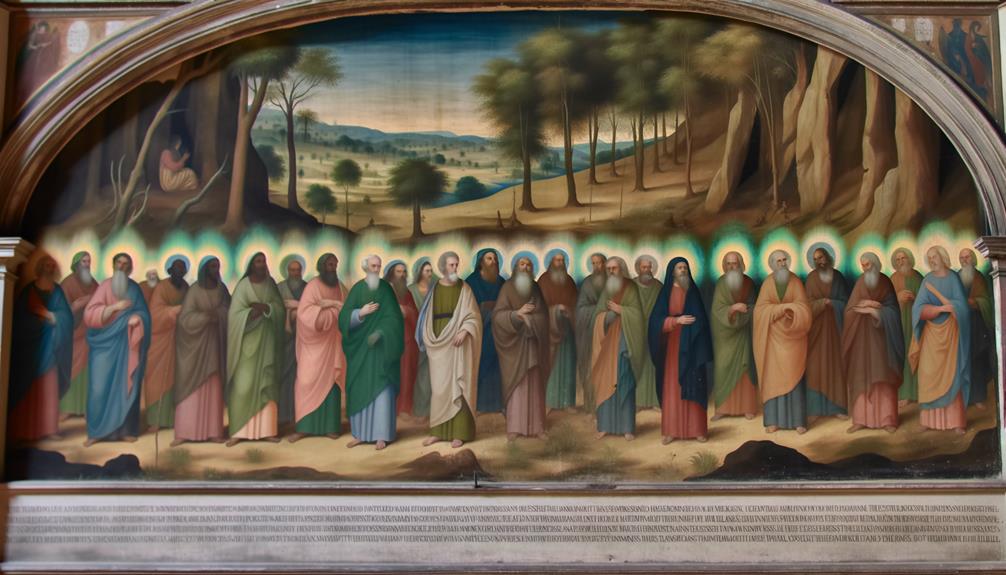Might Meaning in the Bible: Power and Strength
In biblical terms, ‘might’ encompasses both divine omnipotence and human strength, translated from Hebrew ‘chayil’ and Greek ‘dynamis’. These terms signify not only physical power but also moral and spiritual fortitude.
Old Covenant narratives, such as Samson’s feats and David’s victory over Goliath, highlight the integration of divine empowerment with human action. In the New Covenant, ‘might’ evolves to emphasize spiritual strength, particularly in Paul’s epistles.
This concept illustrates God’s provision of strength for righteous living and spiritual resilience. Consequently, understanding ‘might’ in its biblical context enriches one’s comprehension of divine-human interaction across scripture.
For further insights, consider exploring its various applications and theological significances.

Might Meaning in the Bible: Power, Strength, and Divine Authority
| Aspect | Details |
|---|---|
| Definition | Physical strength, power, or force; also refers to spiritual and moral force |
| Hebrew/Greek Terms | Hebrew: koach, oz; Greek: ischus, dunamis |
| Used In Scripture | Often used to describe God’s power (Deuteronomy 6:5, Ephesians 1:19) |
| Symbolism | Represents divine strength, courage, and the empowerment of believers |
| Spiritual Lesson | Teaches reliance on God’s might rather than human power |
Definitions of Might

In biblical scholarship, ‘might’ is often examined through its linguistic, cultural, and theological dimensions, each contributing to a thorough understanding of the term within scriptural contexts.
Linguistically, the Hebrew word ‘chayil’ and the Greek word ‘dynamis’ are frequently translated as ‘might,’ denoting strength, power, and capability.
Culturally, ‘might’ encompasses not only physical prowess but also moral and spiritual fortitude, reflecting the values and societal norms of ancient communities.
Theologically, ‘might’ is attributed to divine attributes, underscoring God’s omnipotence and the empowering presence bestowed upon individuals.
This multifaceted exploration of ‘might’ reveals its integral role in expressing both human and divine strength, making it a pivotal concept in biblical narratives and theological discourse.
Old Testament Examples

Many instances in the Old Scriptures illustrate the concept of ‘might,’ particularly through the narratives of figures such as Samson, David, and Joshua, where divine strength and human agency converge.
Samson’s extraordinary physical prowess, as depicted in Judges, symbolizes God’s empowerment for the deliverance of Israel. David’s victory over Goliath in 1 Samuel exemplifies faith and courage, demonstrating that true might stems from reliance on God.
Joshua’s leadership, chronicled in the eponymous book, underscores the amalgamation of divine support and human action in conquering Canaan. These examples articulate a theological framework where ‘might’ is not merely physical strength but a divinely endowed force enabling individuals to fulfill God’s purposes.
Such instances underscore the symbiotic relationship between divine omnipotence and human responsibility.
New Testament Examples

The New Covenant shifts the understanding of ‘might’ from physical prowess to spiritual strength, exemplified through the teachings and miracles of Jesus Christ and the apostolic ministry. This transformation is evident in several New Scriptures passages where ‘might’ is synonymous with divine power, moral courage, and the fortitude to uphold faith amidst persecution.
For instance, Paul’s epistles frequently reference the ‘might’ of God as an enabling force for believers to live righteously and withstand spiritual adversities.
| Passage | Context | Interpretation |
|---|---|---|
| Ephesians 6:10 | Armor of God | Spiritual preparedness |
| 2 Corinthians 12:9-10 | Paul’s weaknesses | Strength in vulnerability |
| Acts 1:8 | Receiving the Holy Spirit | Empowerment for witness |
Thus, ‘might’ in the New Scriptures is deeply rooted in spiritual empowerment and divine intervention.
Might in Psalms

The Psalms repeatedly underscore the concept of God’s omnipotent strength, portraying Him as a sovereign force whose might guarantees divine protection for His people.
This assurance of safety underpins the psalmists’ expressions of trust and dependence on God’s power.
Additionally, the theme of might prominently features in worship, where the psalms extol God’s unparalleled power and majesty, reinforcing the communal and individual acknowledgment of His supreme authority.
God’s Omnipotent Strength
In the Psalms, God’s omnipotent strength is depicted through vivid metaphors and expressions that emphasize His unparalleled power and sovereignty over creation. The psalmists employ a variety of literary devices to convey the awe-inspiring might of the divine. For instance, God is likened to a fortress, a rock, and a shield, symbolizing both His protective and unyielding nature.
| Metaphor | Psalm Reference | Emotional Impact |
|---|---|---|
| Fortress | Psalm 18:2 | Security and refuge |
| Rock | Psalm 18:31 | Unwavering stability |
| Shield | Psalm 28:7 | Protection and defense |
These metaphors not only illustrate God’s strength but also evoke deep emotional responses, reinforcing His omnipotence and the comfort He provides to believers.
Divine Protection Assurance
Throughout the Psalms, divine protection is affirmed through the portrayal of God’s might as a shield and fortress, offering believers assurance and unwavering security. This theological theme underscores a covenantal relationship where God’s omnipotence becomes a refuge for the faithful.
The Psalms highlight this assurance through various metaphors and literary devices:
- Psalm 18:2 – ‘The Lord is my rock, my fortress, and my deliverer,’ illustrating God’s role as a steadfast protector.
- Psalm 91:4 – ‘He will cover you with his feathers, and under his wings you will find refuge,’ emphasizing protection and care.
- Psalm 46:1 – ‘God is our refuge and strength, an ever-present help in trouble,’ reinforcing the idea of divine might in crisis.
These passages collectively foster a profound trust in divine protection.
Power in Worship
Within the Psalms, the depiction of divine might serves as a central motif that enhances the power and fervor of worship. This theological construct accentuates God’s omnipotence, invoking reverence and awe among believers.
Psalm 29, for instance, vividly portrays the voice of the Lord as thunderous and majestic, breaking cedars and shaking deserts, thereby manifesting His unparalleled sovereignty. Such imagery not only reinforces God’s supreme authority but also elevates the worship experience by inviting the faithful to witness His formidable strength.
Additionally, Psalm 93 emphasizes the Lord’s reign and might, establishing His dominion over chaos and creation.
This scholarly examination reveals that the acknowledgment of divine might within the Psalms enriches worship, fostering a profound sense of spiritual connection and devotion.
Prophets on Might

Examining the words of the prophets reveals a nuanced understanding of might as an attribute that transcends mere physical strength, embodying divine authority and spiritual power. Prophetic literature often presents might as a reflection of God’s omnipotence and moral governance.
Significantly, three key aspects emerge:
- Divine Sovereignty: Prophets like Isaiah emphasize God’s unparalleled control over nations and history (Isaiah 40:23-24).
- Spiritual Strength: Jeremiah underscores internal fortitude, derived from faith and obedience (Jeremiah 17:7-8).
- Redemptive Power: Ezekiel illustrates God’s ability to renew and restore, even from utter desolation (Ezekiel 37:1-14).
These themes collectively articulate a vision of might that is inherently linked to divine will and spiritual resilience, rather than mere human capability.
Jesus and Might

In examining the concept of might as it pertains to Jesus, one must consider His divine authority, which is evident in His teachings and actions.
Additionally, His performance of miracles underscores a unique manifestation of might, serving both as a proof of His divinity and as a means to fulfill His earthly ministry.
This duality of authority and miraculous power encapsulates the biblical understanding of might in the context of Jesus’ life and mission.
Jesus’ Divine Authority
Jesus’ divine authority is a central theme in the New Covenant, manifesting through His miraculous deeds, authoritative teachings, and fulfillment of prophetic scriptures.
This authority is evident in several key aspects:
- Teaching with Authority: Unlike the scribes, Jesus taught with unprecedented authority, often prefacing His teachings with ‘But I say to you,’ thereby asserting a divine prerogative.
- Prophetic Fulfillment: Jesus’ life and ministry fulfilled Old Scriptures prophecies, affirming His messianic role and divine mission.
- Authority over Nature and Spirits: Commanding the storm to cease and expelling demons both underscore His sovereignty over creation and the spiritual domain.
These facets collectively underscore Jesus’ divine authority, inviting believers to recognize His unique position within the biblical narrative.
Miracles Through Might
Through His miraculous acts, Jesus demonstrated divine might, thereby revealing His identity and mission with unparalleled clarity.
These miracles, ranging from healing the sick to calming storms, serve as tangible manifestations of His divine authority. Each act not only alleviated immediate human suffering but also symbolized the breaking of natural and spiritual barriers.
The multiplication of loaves and fish (Matthew 14:13-21) and the raising of Lazarus (John 11:1-44), for instance, underscore His dominion over life and creation.
Additionally, these acts of might were didactic, illustrating profound theological truths about God’s kingdom and Jesus’ redemptive purpose.
Hence, through His miracles, Jesus’ divine might becomes a pivotal element in understanding His role as the Messiah.
Apostles on Might

The apostles’ understanding of might, as reflected in their epistles, frequently emphasizes the spiritual strength derived from faith in Christ and the empowerment of the Holy Spirit. This concept surfaces prominently in various writings, illustrating the multi-faceted nature of apostolic teaching on might.
Key aspects include:
- Dependence on Divine Power: Paul’s letters often underscore that true strength emanates from reliance on God’s power rather than human effort (Ephesians 6:10).
- Endurance and Perseverance: James highlights that spiritual might enables believers to endure trials with steadfastness (James 1:12).
- Witness and Ministry: Acts records the apostles performing miracles and preaching boldly, actions attributed to the Holy Spirit’s might (Acts 4:33).
Through these elements, the apostles articulate a vision of might deeply rooted in spiritual conviction and divine enablement.
Spiritual Strength

The concept of spiritual strength in the Bible encompasses both divine empowerment and inner spiritual resilience. Scriptural texts frequently highlight how God imparts strength to believers, enabling them to overcome trials and fulfill divine purposes.
Additionally, inner spiritual resilience is portrayed as a fundamental aspect of faith, sustaining individuals through periods of adversity and spiritual growth.
Divine Empowerment in Scripture
Divine empowerment in Scripture, often manifested as spiritual strength, is a recurring theme that underscores the transformative power of faith and divine intervention in the lives of believers. This empowerment is evident through:
- Biblical Figures: Figures such as Samson and David, whose extraordinary feats were attributed to God’s strength.
- Prophetic Encouragement: Prophets like Isaiah and Jeremiah who assured Israel of divine aid in times of distress.
- New Covenant Teachings: Apostolic writings emphasizing the empowerment of the Holy Spirit, as seen in Acts and Pauline epistles.
These examples illustrate a theological framework where divine strength transcends human limitations, enabling believers to accomplish God’s purposes.
This dynamic interplay between divine provision and human action is central to understanding spiritual strength in biblical theology.
Inner Spiritual Resilience
Exploring inner spiritual resilience within biblical theology reveals how foundational faith and divine presence are to sustaining believers through life’s trials.
Scriptural narratives often depict figures like Job, who, despite immense suffering, remains steadfast through a profound trust in God’s sovereignty.
The Apostle Paul, in 2 Corinthians 12:9-10, illustrates this resilience by embracing his weaknesses, believing that Christ’s power is perfected within them.
Such texts underscore the theological premise that inner strength is not merely a human attribute but a divine gift, nurtured through continuous communion with God.
Consequently, spiritual resilience is portrayed not as an inherent personal virtue, but as a manifestation of divine grace, enabling believers to endure and thrive amidst adversities.
Moral Courage

Demonstrating moral courage in the Bible often involves adhering to ethical principles in the face of adversity and opposition. Such exemplars of moral courage are pivotal in theological narratives, revealing the essence of faith and integrity.
Key instances include:
- Daniel in the Lion’s Den: Daniel’s unwavering faith, even when faced with death, epitomizes steadfastness in divine laws.
- Esther’s Bravery: Queen Esther’s willingness to risk her life to save her people underscores the virtue of self-sacrifice for a greater moral cause.
- Jesus’ Crucifixion: Jesus’ acceptance of crucifixion, despite immense suffering, illustrates the ultimate act of moral fortitude and obedience to divine will.
These examples underscore the Bible’s emphasis on moral courage as a foundational virtue.
Relevance Today

Understanding the relevance of biblical moral courage in contemporary society requires a nuanced examination of how these ancient narratives continue to inform ethical decision-making and personal integrity today.
The themes of courage, justice, and divine guidance found within the Bible remain significant as they offer timeless principles that transcend cultural and temporal boundaries. Their applicability to modern dilemmas is evident in various spheres such as leadership, social justice, and personal ethics.
| Aspect | Biblical Example | Contemporary Application |
|---|---|---|
| Moral Courage | David vs. Goliath | Standing against oppression |
| Ethical Leadership | Moses leading Israelites | Integrity in governance |
| Social Justice | Prophets condemning injustice | Advocacy for human rights |
| Personal Integrity | Joseph’s resilience | Upholding truth and honesty |
These narratives provide a framework for addressing ethical challenges in today’s complex world.
Conclusion
To sum up, the concept of ‘might’ in the Bible encompasses multifaceted dimensions, including physical power, spiritual strength, and moral courage.
Old Scripture narratives illustrate divine might through miraculous acts and prophetic declarations. New Testament teachings emphasize spiritual fortitude and apostolic exhortations.
The Psalms and prophetic literature extol God’s omnipotence, while apostolic writings advocate for inner strength. Understanding biblical might offers profound insights into faith, resilience, and divine empowerment, remaining profoundly relevant in contemporary spiritual discourse.






